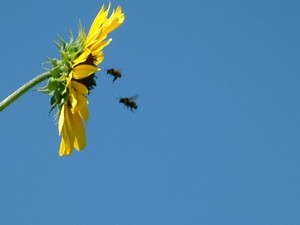06 Apr Mon 2009
the Duck named Rooster
The duck named “Rooster” thinks that he is a chicken. He was raised with two hens and, when we adopted the three friends at the shelter, was quite confused. He takes good care of his hens, making sure they find ponds to bathe in (though they don’t want to bathe in the water - they prefer dust baths - he pushes them in). He finds them good things to eat and then eats them himself to demonstrate that they are good, urging them to join him with his “tasty” call, which they do not understand. He herds them about with his mallardly mastery using words and gestures they understand as well as those used by real roosters. He also sits on their eggs and defends them.
His inability to communicate with his hens is a problem, but nothing so severe as to break his love for each other. They are his hens and he is their rooster - er, duck.
He also take care of the other chickens. He has a special friendship with Scuttle and will treat him like a hen. Ducks can’t tell the difference easily between roosters and hens.
We love “Rooster” almost as much as the hens and real roosters do. He stands guard at night over the entire flock like a rooster ought to, taking shifts with Rodney and Scuttle (the other roosters are too tired to take a shift). Like a rooster, he sings them songs to let them know everything’s alright, or alert them that something strange is happening. He announces when we come by, and a few of the chickens stagger up to us to see if we’ve brought them a treat.
Any time two species make friendship or love each other, they learn how to talk to each other or otherwise serve each others’ needs. When humans adopt a pet, either domesticating a wild critter or taking in a domestic one, we teach them some of our language so they can help us, too.
All our birds know how to “go home,” “find your rooster,” “hide,” and “come to the coop!” We teach them several dozen commands. Some are very friendly, and enjoy being picked up. Because, when they are young, we help them if they are injured in front of the entire baby flock, they know to come to us when they need help.
Yesterday, some of our geese got attacked by a coyote. The coyote lost, and now looks for mice to eat, but one of the geese got a scratch on her leg. She ran up to us and wanted to be held, so we told her to give us her leg for us to inspect. We told her it was alright and gave her some treats. She rested for most of the day, and her flock kept her company.
Like our “Rooster” duck, all animals understand more words of another species’ language than they can speak. Though we could not express ourselves in “goose” we could express ourselves in english, and she understood, giving us her leg and holding still. She could tell us something was wrong with her and we understood. The duck can tell his hens about the joys of bathing and… well, perhaps some things can’t be understood.

